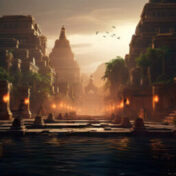
Where are we?
Torkal’s wars is set in a parallel universe to the roman / greek history where you can find all fantasy races. What would be different in such universe? Read an example below set in the town of Krilos, far earlier than the story of Torkal. Will Krilos be a welcoming land?
If you like it, read more about Torkal here.
The story
The Palace overlooks the town of Krilos, the harbor with its renowned great lighthouse, and the hills behind and their olive trees. It is a magnificent structure designed by the dwarves of the island. A thousand craftsmen built it, each adding his own priceless sculpture or paintings. Even elves worked on the worksite. And all pieces discarded from the palace make their way to the lower city, a busy merchant town with their bright houses, lively tabernae and street shops along the plazas.
The sun rises to the east and colors in red the throne room where the king receives his clients. By midday, it crushes the multiple courtyards, and the courtiers hide in the shadows behind the colonnades. In the evening, the crowd moves to the great banquet hall, just above the theater. Lamps are lit everywhere, and masks play below the comedies from the best authors around the Great Sea. Laughs echoes in the great halls and the passages between them while platters of food and drink are served to every guests. Even servants join the feast before its end.
It is a place of art and culture, of peace and joy, and all praise the wisdom of the king.
From time to time, a foul odor escapes the underground, and the visitors bring a clean handkerchief to their nose for a little time. Then, the odor is whiffed away by the wind blowing from the sea, and all breathe better. No one really complains. Krilos is such a welcoming place, isn’t it? Some wonder why the dwarves couldn’t get rid of it by their clever pipes, but not for long.
At night, when the parties quiet down, howls of fury echo through the corridors, coming from the lower levels of the palace. Few hear them, lost in the vapors of the free alcohol served to every guest and servant. In the lower city, the shutters and doors are closed, and no one leave its home after nightfall. Sometimes, a drunken sailor leaves its boat in search of a tabernae, but few have made it back to their bireme by next morning. With so many boats, tabernae, and opportunities inland, this can happen. Sometimes, a guest leaves the party and never returns. Everyone is free on the island, to stay or to leave, and who should complain when life is so wonderful?
Boats sail there from distant Antiago, Elimar or Toulania, many come from the closer shores of Grisos, and all kings, even the mighty Emperor of Darsenia, send emissaries to the great ceremonies marking the seasons. Few stays for long, a week sometimes, fewer days when possible without offending the king. This is a delicate exercise, a mandatory mission for junior members of the diplomatic corps around the Great Sea. You have only to carry it once in your career, but without it, you’ll not be named full ambassador. Strange, isn’t it? Krilos is such a welcoming land.
In the mountains far to the south, a Pythie has spoken, strange words from the gods, but repeating them is a sentence of death. In a trance, she has seen a hero who will sail to the island, be welcomed as a guest by the king, and walk the mazes below the palace to emerge, alive, by next day. But why would a hero be needed when everything is in harmony? Why, indeed?
To the west, another grisian boat, black sails raised above it, has appeared.

 Fan of science fiction and fantasy, both of the great classics and of the indie authors, I have now taken the step to write my own books. I want to provide fun, adventure, and explore different universes.
Fan of science fiction and fantasy, both of the great classics and of the indie authors, I have now taken the step to write my own books. I want to provide fun, adventure, and explore different universes.